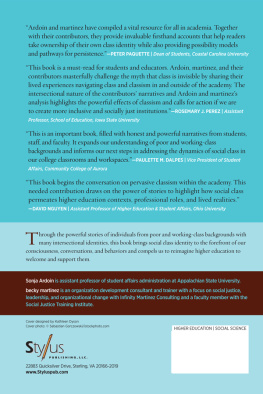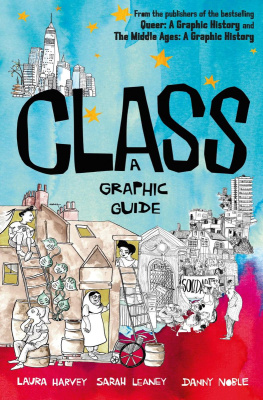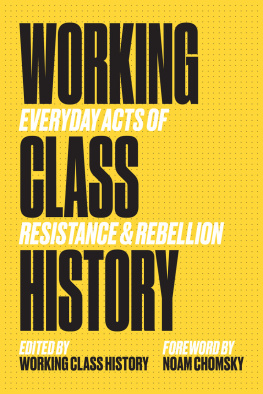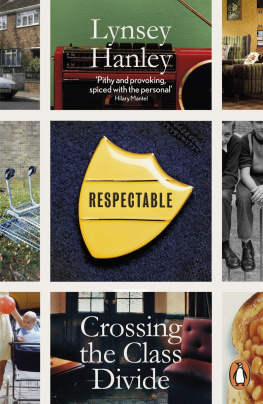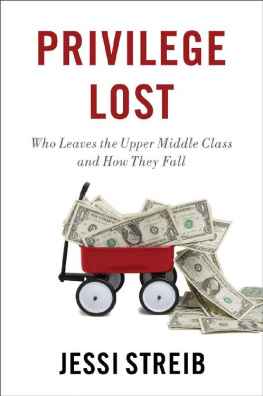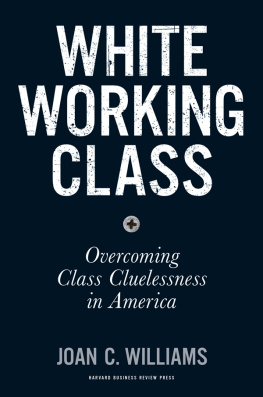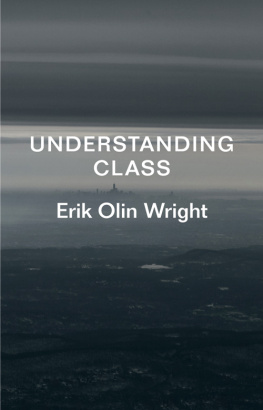Sonja Ardoin - Straddling Class in the Academy: 26 Stories of Students, Administrators, and Faculty from Poor and Working-Class Backgrounds and Their Compelling Lessons for Higher Education Policy and Practice
Here you can read online Sonja Ardoin - Straddling Class in the Academy: 26 Stories of Students, Administrators, and Faculty from Poor and Working-Class Backgrounds and Their Compelling Lessons for Higher Education Policy and Practice full text of the book (entire story) in english for free. Download pdf and epub, get meaning, cover and reviews about this ebook. year: 2019, publisher: Stylus Publishing, genre: Politics. Description of the work, (preface) as well as reviews are available. Best literature library LitArk.com created for fans of good reading and offers a wide selection of genres:
Romance novel
Science fiction
Adventure
Detective
Science
History
Home and family
Prose
Art
Politics
Computer
Non-fiction
Religion
Business
Children
Humor
Choose a favorite category and find really read worthwhile books. Enjoy immersion in the world of imagination, feel the emotions of the characters or learn something new for yourself, make an fascinating discovery.
- Book:Straddling Class in the Academy: 26 Stories of Students, Administrators, and Faculty from Poor and Working-Class Backgrounds and Their Compelling Lessons for Higher Education Policy and Practice
- Author:
- Publisher:Stylus Publishing
- Genre:
- Year:2019
- Rating:5 / 5
- Favourites:Add to favourites
- Your mark:
Straddling Class in the Academy: 26 Stories of Students, Administrators, and Faculty from Poor and Working-Class Backgrounds and Their Compelling Lessons for Higher Education Policy and Practice: summary, description and annotation
We offer to read an annotation, description, summary or preface (depends on what the author of the book "Straddling Class in the Academy: 26 Stories of Students, Administrators, and Faculty from Poor and Working-Class Backgrounds and Their Compelling Lessons for Higher Education Policy and Practice" wrote himself). If you haven't found the necessary information about the book — write in the comments, we will try to find it.
Why do we feel uncomfortable talking about class? Why is it taboo? Why do people often address class through coded terminology like trashy, classy, and snobby? How does discriminatory language, or how do conscious or unconscious derogatory attitudes, or the anticipation of such behaviors, impact those from poor and working class backgrounds when they straddle class?
Through 26 narratives of individuals from poor and working class backgrounds ranging from students, to multiple levels of administrators and faculty, both tenured and non-tenured this book provides a vivid understanding of how people can experience and straddle class in the middle, upper, or even elitist class contexts of the academy.
Through the powerful stories of individuals who hold many different identitiesand naming a range of ways they identify in terms of race, ethnicity, gender, sexuality, age, ability, and religion, among othersthis book shows how social class identity and classism impact peoples experience in higher education and why we should focus more attention on this dimension of identity.
The book opens by setting the foundation by examining definitions of class, discussing its impact on identity, and summarizing the literature on class and what it can tell us about the complexities of class identity, its fluidity, sometimes performative nature, and the sense of dissonance it can provoke.
This book brings social class identity to the forefront of our consciousness, conversations, and behaviors and compels those in the academy to recognize classism and reimagine higher education to welcome and support those from poor and working class backgrounds. Its concluding chapter proposes means for both increasing social class consciousness and social class inclusivity in the academy. It is a compelling read for everyone in the academy, not least for those from poor or working class backgrounds who will find validation and recognition and draw strength from its vivid stories.
Sonja Ardoin: author's other books
Who wrote Straddling Class in the Academy: 26 Stories of Students, Administrators, and Faculty from Poor and Working-Class Backgrounds and Their Compelling Lessons for Higher Education Policy and Practice? Find out the surname, the name of the author of the book and a list of all author's works by series.

